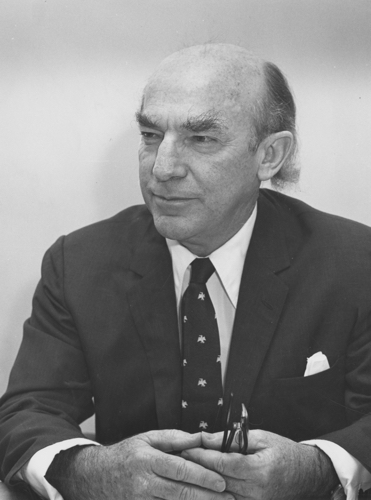Mr Robert Hyslop

Robert Hyslop was born on 24 December 1918 at Pelaw Main (a small mining community between Maitland and Kurri Kurri) the ninth child of William Hyslop, a Scottish coal miner, and his wife Mary (nee Elliott). He grew up in Kurri Kurri and attended Maitland Boys High School from 1931-1935 where he excelled in English, history, geography, mathematics and also gained a life long appreciation of literature, art and music. Despite being short in stature he possessed a high level of self confidence and his family instilled in him a strong belief in the value of education and an appreciation of the arts. He joined the Commonwealth Public Service in 1936 and initially worked with Department of Defence (Navy) at Garden Island as an accounts clerk.
In 1941 he transferred to Navy Office in Melbourne where he served throughout World War II in the Staff and Industrial Branch of the Department of Navy. While not working he enjoyed singing with the Royal Melbourne Philharmonic Choir and acting in several operas and plays with the National Theatre. During his time in Melbourne he met Dorothy Fleming at a tennis party and the two were married on 14 September 1946 at Malvern Baptist Church; they had two children.
During the early 1950s he was Deputy Director of Civil Personnel (Department of the Navy) and later Acting Director of Civil Personnel Branch. During 1958, he and his family resided in England while he attended the Joint Services Staff College and afterwards he spent four months on secondment to the Admiralty before returning to Melbourne. He and his family moved to Canberra, in 1959, when all Defence administration was relocated from Melbourne to the national capital.
Hyslop was appointed as the Assistant Secretary (Naval and Personnel) although he was privately disappointed not to be appointed the Deputy Secretary. During his period in Navy Office he was involved in the decision making to create the joint Australian/United States communications facility (Harold E. Holt) at Exmouth, Western Australia. During 1963-65 he was President of the Institute of Public Administration and drew up a code of ethics for public servants. As Assistant Secretary (Special Projects) in 1965-67 he oversaw the introduction of several new administrative computer systems into the Navy.
In 1968-69 he was a Fellow at the Australian National University and wrote his first book, 'Australian Naval Administration 1900-1939', which was published in 1973. From 1970 until 1974 he was the Deputy Secretary-General of the South East Asian Treaty Organization (SEATO) based in Bangkok, Thailand. Upon return to Australia in early 1974 he was appointed an Assistant Secretary in the newly consolidated Department of Defence under Sir Arthur Tange but was again disappointed with this position and sought alternative employment in the Public Service.
During 1974-76 he was Secretary of the Royal Commission on Human Relationships and in 1977 he became Assistant Secretary (Honours) in the Department of Administrative Services. In March 1980 he was made a Companion of the Imperial Service Order (ISO) in recognition of his of diligent service to the Australian Public Service. Due to ill health he concluded his Public Service career as First Assistant Secretary of the Honour's Secretariat in the Department of the Special Minister of State in 1981. Following retirement he graduated with a Diploma of Art from the Canberra School of Art majoring in Sculpture and during 1987-1992 was a Visiting Fellow in the Department of Political Science (Research School of Social Sciences) at the ANU. He was also a skilled wood turner and helped establish the ACT Woodcraft Guild.
Hyslop was a prolific writer and produced five more books: 'Aye Aye Minister - Australian Naval Administration 1939-59' (1990); 'Dear You: A guide to forms of address' (1991); 'Australian Mandarins: Perceptions of the role of departmental secretaries' (1994); 'First Encounter: communicating with institutions and organisations' (1994); and his autobiography 'A very civil servant: An Australian memoir' (1998). He also had numerous articles published in variety of journals, including several in the 'Canberra Historical Journal', and wrote 14 entries for the 'Australian Dictionary of Biography' (and he was also on the Editorial Panel). Hyslop was a founding member of the Canberra Society of Editors and active as a consultant editor and indexer in the Australian and New Zealand Society of Indexers.
Survived by his wife and two daughters he died in Canberra on 5 July 2007 and was cremated. Known throughout his career as an easy going, modest and hardworking civil servant with an artistic flair, he certainly earned the title of a very civil servant.


